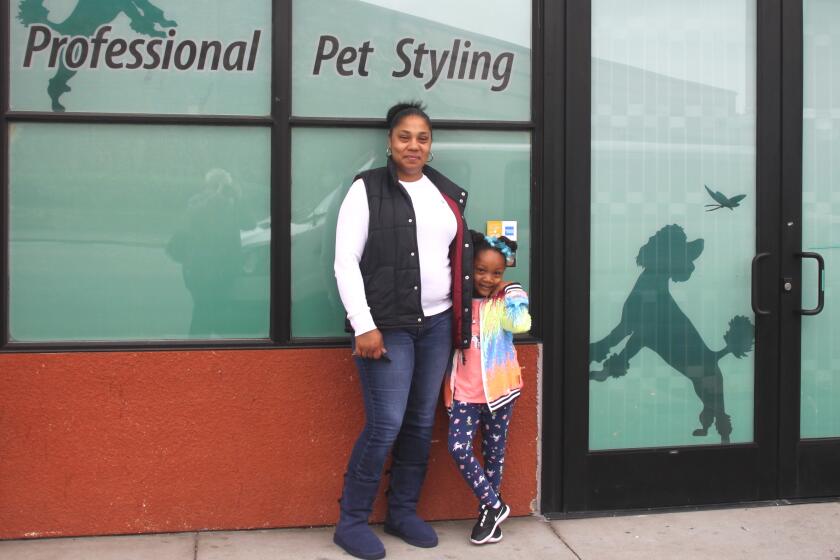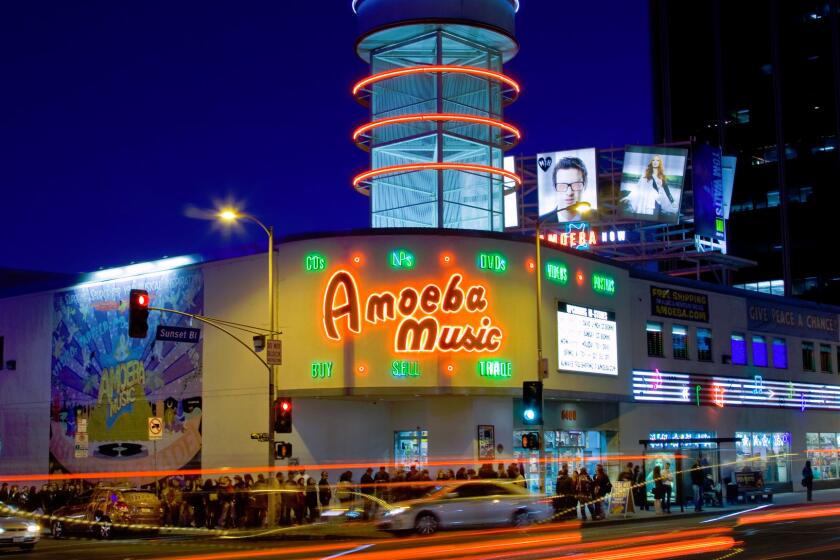This Hollywood book and record shop hangs by a thread, waiting for federal help
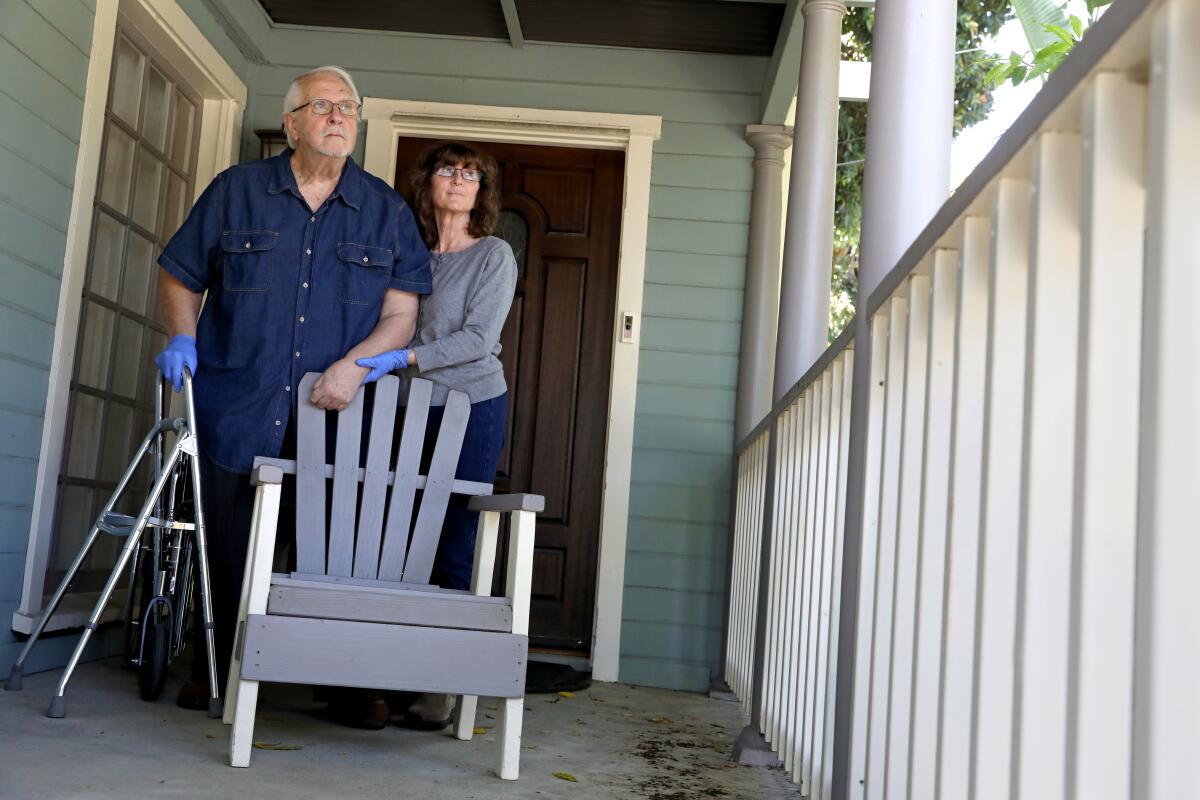
- Share via
Counterpoint Records & Books, serving the Hollywood Hills since 1980, is in danger of closing its doors for good.
In normal times, that wouldn’t count as news anywhere outside the store’s Beachwood Canyon neighborhood. But millions of mom-and-pop businesses have gone dark around the country to fight the spread of the novel coronavirus. Many are just as spooked as Counterpoint Records & Books co-owner Susan Polifronio. With no customers or revenue, with bills still to be paid and debt piling high, the possibility grows every day that many won’t be able to reopen.
The federal government was supposed to help, but its $349-billion small-business-loan program was exhausted in days, with some of the money going to major corporations that include national restaurants and at least one coal mining company. Millions of small businesses that sought loans have yet to see any money, according to the National Federation of Independent Business, which surveyed its members Friday and found that 80% were still waiting on federal help.
The Senate approved a new, $484-billion round of funding Tuesday, and the House of Representatives is due to vote on it by the end of the week. President Trump said he will sign the legislation. Whether major corporations will continue to qualify for the small-business loans at the expense of the mom and pops remains uncertain.
Confusion and frustration bedevil attempts to keep employees on the job while getting a Payroll Protection Program loan.
Polifronio, 68, applied in March for a $10,000 emergency grant that was supposed to arrive in three days; a $1,200 payment for each of her four employees; and, on April 8, a forgivable Paycheck Protection Program loan from Bank of America, all to survive the shutdown until customers could return. She heard from the bank Tuesday, requesting more business documents.
“We haven’t gotten anything yet, and we’re eligible for it all,” she said.
Polifronio hopes for better luck with the new round, but she has no idea whether she’ll need to begin the laborious application process all over again.
Her store manager, David Jones, said the uncertainty is taking its toll. “We don’t know if we’ll get the loan” to meet payroll, he said. “We don’t know whether to furlough ourselves and collect unemployment. We don’t know when we’ll be able to open up. It’s unknown and changing every day, and it makes planning impossible.”
Forty years ago, Polifronio and her husband, John, opened Counterpoint Records & Books in what was then a cozy, affordable neighborhood, located down the hill from the famous Hollywood sign. The store sold used vinyl records and books, including rare collectibles. In recent years it has been adding new vinyl as that retro technology has made a fashionable comeback.
“We served a lot of artists, musicians, people in the film industry — mainly on the camera side rather than the acting side,” she said. “We stayed open until midnight — people came in after they finished gigs.”
The couple survived the rise of the internet and Amazon by tightening their offerings to niche neighborhood tastes. Profit margins were always thin, but they ran the place conservatively. “We’ve had times when we’ve had to pull out of our personal savings, more so since the economy crashed in 2007,” Polifronio said. “But we’ve never generally had to stretch too far.”
She’s still paying three of her employees (the fourth took another job) even with the shop closed, by tapping a line of bank credit, which carries a 7% interest rate. That means racking up debt plus interest.
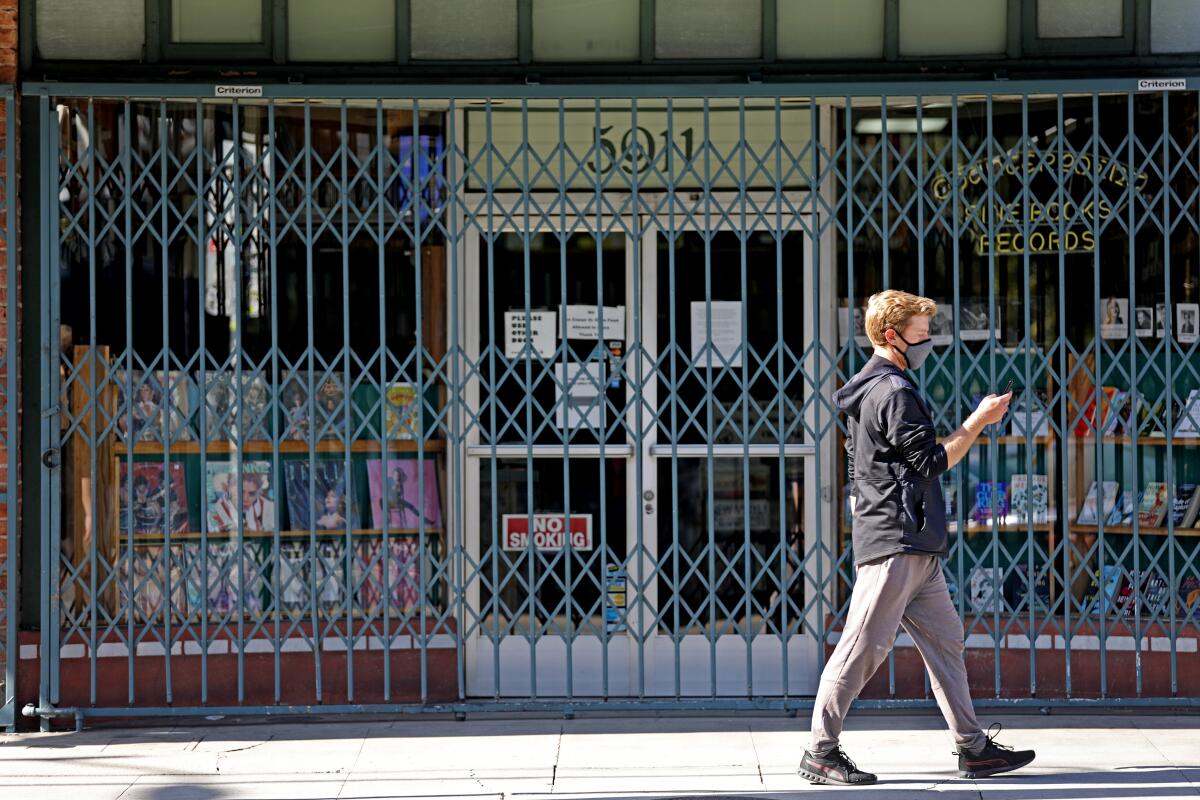
“My mortgage is on hold, but I have to pay it at the end of three months,” she said. She provides health insurance to employees “and Kaiser is allowing me not to pay for now but at the end of three months I’ll have to come up with that, too.”
She’s especially troubled by reports that chain restaurants such as Ruth Chris Steakhouse, Shake Shack and Potbelly took millions in Paycheck Protection Program small business loans, which are guaranteed by the government at low interest rates and in many cases are forgivable, making them more like grants.
“We have weathered many storms. ... But we don’t know that we can weather the COVID-19 storm,” says a new GoFundMe page for California’s beloved Amoeba stores.
The loans are supposed to be limited to companies with 500 or fewer employees. But a loophole in the law let corporations count the number of workers in each physical location, allowing chain stores and restaurants to qualify. (Shake Shack said it would return $10 million in such loans.) Another provision of the law made exceptions for coal companies that employ as many as 1,500 workers.
According to the National Federation of Independent Business, most small businesses don’t approach anywhere near 500 employees. “The vast majority of companies defined as small businesses are in fact very small — under 50 employees,” said Holly Ward, an NFIB executive.
“When they say small business is 500 or less that’s ridiculous,” Polifronio said. “Why don’t they have something for 20 people or less? These are very different kinds of businesses.”
Larger companies have “strong relationships with their banks’ dedicated employees who know how to navigate these kind of situations, while many small-business owners can’t get anybody on the phone to answer application questions much less hold their hands through the process,” NFIB’s Ward said.
After the Senate bill was passed Tuesday, the NFIB issued a statement that called it “good news for America’s small businesses” because “it contains much needed funding.” The group, it said, looks forward to “working with Congress and the administration to address some of the significant challenges small businesses have had with the program.”
Amanda Ballantyne, executive director of the Main Street Alliance small business policy group, issued a statement that said the new legislation still suffers from “design flaws.” Among the group’s recommendations: a grant program for businesses with fewer than 50 employees; more flexibility on what the money can be used for to qualify as forgivable and more transparency about who is getting the loans and for how much.
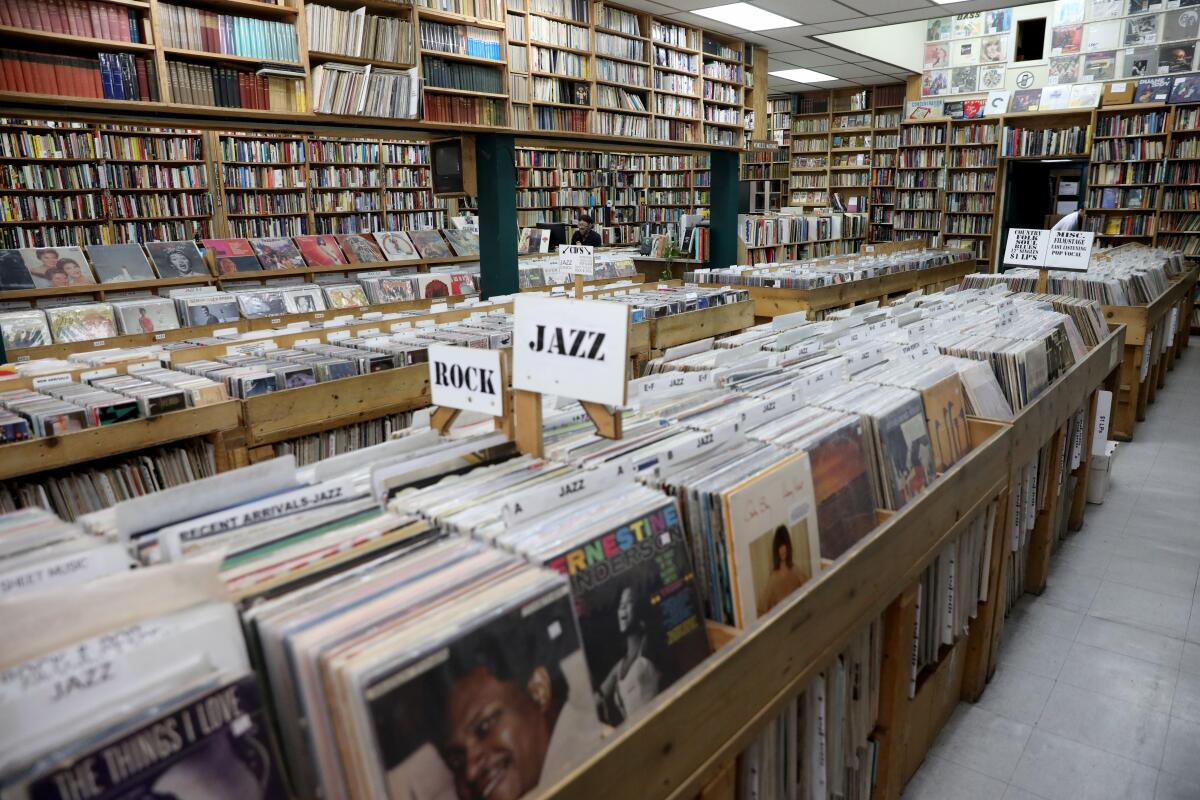
Next door to Counterpoint Records & Books on Franklin Avenue, Dean Chamberlain and his wife, Cynthia Kaschak-Chamberlain, own The Canyon clothes boutique, which sells new and vintage clothes inspired by the 1970s. The store’s unofficial slogan is “be cool, be yourself, dig where you are,” said Chamberlain, 67, a self-described “old hippie.”
Chamberlain applied for a $10,000 SBA disaster grant offered as part of the program. He said $4,000 showed up in his bank account a few days ago, courtesy of the SBA, but with no explanation of why he didn’t get the full amount.
“There are people pissed off about it or freaked out” about disorganization and poor communication in the bailout programs, he said, but “I’m having more patience. We’ve never faced this before. I’m not expecting the feds to have it totally together. They’re people, too. What I am pissed off about is to hear about the chain restaurants and multi-multi-multi-million-dollar businesses siphoning off the business loans.”
He’s afraid that Beachwood Canyon could lose what’s left of its character if the small independent businesses go bust and more chain stores and franchises move in.
“This neighborhood in particular has fought to keep these franchises out,” he said. He’s hoping local customers will pitch in to keep independents alive.
After COVID-19, “a sense of neighborhood is going to become more important,” he said. “We can’t be as mobile as we want to be. The sense of community will be amplified.”
More to Read
Inside the business of entertainment
The Wide Shot brings you news, analysis and insights on everything from streaming wars to production — and what it all means for the future.
You may occasionally receive promotional content from the Los Angeles Times.
